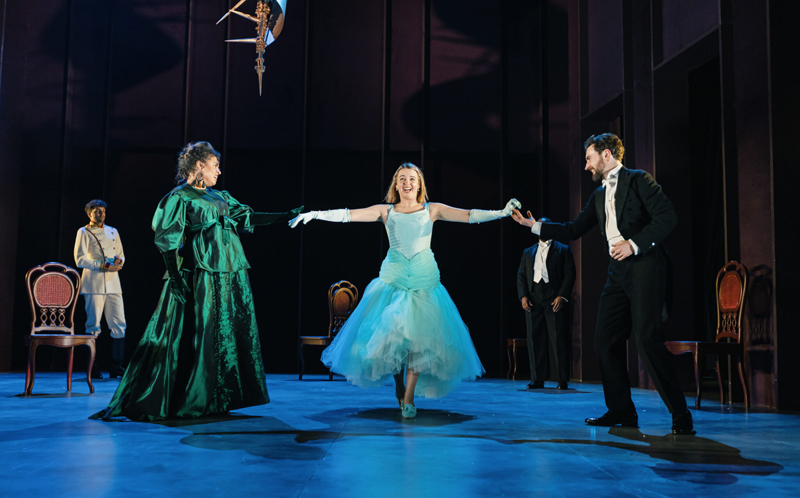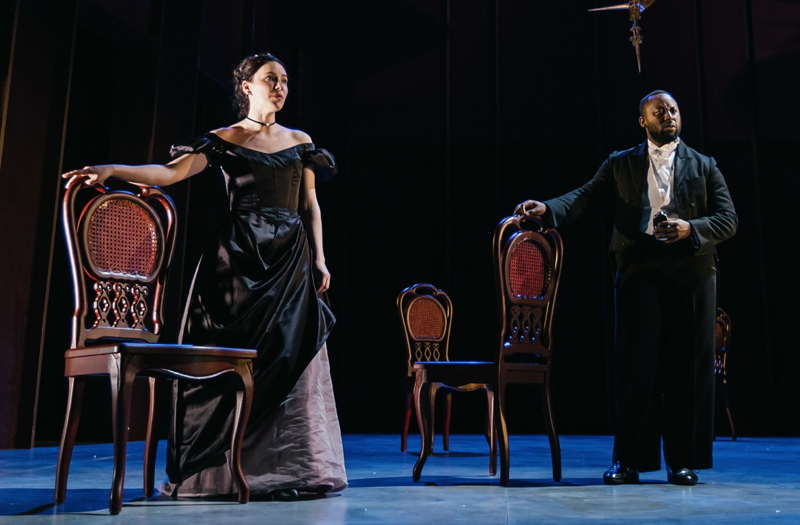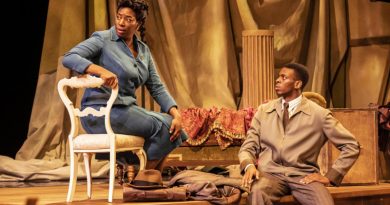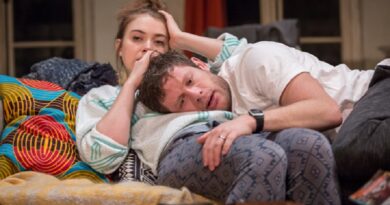“Anna Karenina” at Bristol Old Vic
Simon Thomas in the South West
11 June 2023
In the 1960s, Bristol Old Vic mounted a very successful production of Erwin Piscator’s adaptation of War and Peace. Now, over half a century later the same venue plays host to the Royal Lyceum Theatre Edinburgh’s staging of Tolstoy‘s other great novel Anna Karenina. Much has changed in theatre over that time and we are now in the age of re-imaginings, so it would be foolish to expect a straightforward rendering of a classic book. Mind you, Piscator (who was a major influence on Bertolt Brecht) was exploiting the earlier novel to explore his own ideas of epic theatre, so maybe not so much has changed.

The company.
Photo credit: Robbie McFadzean.
The tone of this new production is set with Dolly Oblonskaya’s strident “What the fuck is this?” and a stream of non-Tolstoyan expletives and other anachronisms follow. None of the modernisms or the sheer Scottishness of the production robs the story of its Russian heart, which beats ferociously throughout the evening.
Writer Lesley Hart and director Polina Kalinina work wonders translating the complex psychological story to the stage without resorting to narration, something that mars so many book-to-theatre adaptations (even Piscator relied heavily on a narrator for War and Peace). Hart has created a stand-alone play while paying homage to the key themes of Tolstoy’s 900-page novel. Hart and Kalinina together, working closely at all stages of the project during its four-and-a-half-year gestation, give us many highly theatrical and thrilling set pieces.
Splicing Kitty and Levin’s ice-skating encounter into a dinner table scene is both an amusing and a highly effective way of illustrating their clumsy relationship. The consummation of Anna and Vronsky’s passion is explosively realized with stylized movement, lighting, and sound. Vronsky’s tragic horse ride is a little clunkier and a bit longwinded, although personifying the horse Frou-Frou is an interesting flourish.
Lindsey Campbell is an Anna for our times, virtuously resisting desire before plunging headlong into her tempestuous adulterous affair. She is passionate, defiant, vacillating, and sometimes funny in a detailed and deeply truthful portrayal of the ambiguous heroine. Stephen McCole’s stern Karenin skilfully walks a tightrope between sympathy and tyranny.
Angus Miller stands out as a clownish Stiva, the feckless adulterer, constantly larking around and flirting with even the stagehands, while Jamie Marie Leary lends strong support as his long-suffering but fiercely assertive wife Dolly. In an impressive professional debut, Tallulah Greive is a fiery Kitty and all the women are a far cry from Tolstoy‘s passive 19th-century feminine stereotypes.
Another debutant, the towering Robert Akodoto, is more awkward, not quite capturing Vronsky’s seductive charm and Ray Sesay as Kostya Levin never gets the chance to fully explore his character’s spiritual angst, with the focus of the production more on the passion of Anna. Despite the book’s title, Levin is perhaps the centre of Tolstoy’s interests; after all he kills off Anna early to concentrate on the male protagonist’s psychological dilemma. Hart puts Anna squarely in this production’s spotlight.
Anna’s dramatic exit is another powerful theatrical punch, which is followed by a gentle and moving coda of remembrance involving Anna’s small boy Seryozha, a touching performance by the unspecified child actor. There are some fudged moments as the evening progresses, where the cogs don’t mesh quite so well as earlier, but overall there is a miraculous interweaving of scenes and incidents in a forthright telling of the story that honours the central content of Tolstoy’s novel while allowing covert exploration of more modern issues.
Emma Bailey’s sets do just enough to support the fast-flowing and ever-changing action, often leaving it bare, for the actors to paint the scene. A panel upstage frequently reveals striking tableaux depicting key moments in the lives of the characters: childbirth, burgeoning love, sudden death, and family conflict.
Hart and Kalinina’s vision and achievement, and the sterling work of a tight ensemble, deserves greater exposure than the two brief runs in Edinburgh and Bristol. A tribute to Russian culture may not be comfortable for everyone in the current world situation but, celebrating what is good about a once great nation, seeing this Anna Karenina go further would be appropriate.
.
.
~









